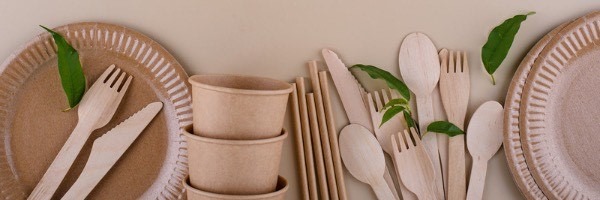Contributed by Sustainability Co-Chair, Stacy Johnston
As Chefs, I’m sure we’re all very aware of the issues facing our planet right now. Whether it’s the effects of global warming on the products we know and love, or the effects of economic downturn we’re feeling from the farmer all the way to the consumer. There’s lots to worry about. I know I, and hopefully you, feel the need to be supporting the right people, products and missions that will make our industry sustainable and workable for years to come.
As I’m sure we’re all aware, the government of Canada is working on passing new Single-use plastics prohibition regulations. They are aimed at the goal of achieving Zero plastic waste by 2030, which, though a noble goal, does have impacts on our lives. British Columbia has already started putting these regulations through in a phased-out effect.
Lots of restaurants rely solely on take out containers, cups and so on. In fact, most of our peers use single use plastics in one way or another… and now we’re facing a fine. Not following their regulations can start with a $400- $2000 initial violation fine and $500-$4000 for subsequent violations. I’m sure we can all relate to not having enough extra wiggle room with our finances to deal with this!
So, this all seems a bit doom and gloom. However, I thought it might be handy to put together a few guidelines and recommendations to help your restaurant avoid unwanted fines. Here’s a list of things of the upcoming restrictions in BC.
Banned as of December 2023
Takeout bags: basically any type of plastic bags are a no go. Think instead- paper bags and reusable fabric ones (which you have to charge for)
Plastic Cutlery/utensils: Anything that can’t make it through a dishwasher 100+ times is a no go. Try wood or pressed plant fibre instead.
Plastic straws and stir sticks: Paper or sugar cane seem to be the new go to.
Banned as of July 2024
Takeaway containers made out of traditional plastics/styrofoam. Think instead - recyclables. Paper, aluminum, glass or easily recyclable plastics. I know, Google it.
Plastic ring carriers (think 6-packs and the plastic that we’ve all seen around a turtle’s neck)
Foodservice accessories including lids, sleeves, straws, condiments, napkins, utensils and wet wipes are also out. To be clear- these guys can be given upon request to your customer, or can be available for self serve…but still no plastic.
Banned as of July 2028
PVC film wrap usage will be restricted and in July 2030 say goodbye to that polystyrene foam tray beneath your steak.
Essentially - stay away from plastic, styrofoam and other things we know we shouldn’t be using. I know we’re all used to reading ingredients on the sides of food boxes, I guess it’s time we start reading the sides of our takeout box containers too.
Perhaps like me, you thought you were safe because your products stated they were ‘compostable’ or ‘biodegradable’. Well, think again. There are only 328 facilities in the country that are able to process the disposal of these items sustainably. Chances are, our waste isn’t making it to them. Therefore, the majority of them are still banned as of July 2024.
So - where does this leave your friendly neighborhood restaurateur who wants to do what’s best for the planet (with a side of not getting fined)?
Looking for alternatives, and I promise there are alternatives. You’ve probably already gotten used to paper bags at the grocery store and are seeing food vendors getting creative. In Penticton, BC, one such food vendor has caught my eye.
One14 Coffee Co, have been advertising their use of, ‘The Good Cup’. It’s a paper cup that needs no lid- its lid is built in and with some fun origami, you get a sealed hot (or cold) drink cup. It’s certified compostable at home, recyclable with paper and biodegradable. It is actually perfect for our new regulations - and, great news, it’s available in Canada. It’s won awards, it has accolades and it’s actually really comfortable to drink out of. For Katie Hurley (who has a background in hospitality sustainability) and Laura Chapman, the co-owners of One14 Coffee Co, it was a no brainer.
When Laura found ‘The Good Cup’ online, it was a hallelujah moment. Being aware of the single use plastic ban, it was something both owners really wanted to have in their cafe. So much so that they pushed and pushed until the Good Cup started a Canadian wholesaler. I won’t say just for them, but after meeting these two powerhouses, I’ll give them all the credit!
Their concept of ‘Feel good, all around’, really tied into using these cups and filling them with delicious, locally roasted coffee. They source primarily locally, reuse where they can and Katie even keeps their coffee grounds and takes them home to sew into her own compost. That’s dedication. They’re also two working Mom’s running a successful business together. We all know the hard work that takes.

Now oftentimes, these innovative products are cost prohibitive. But according to Katie, the cost of one of their hot/cold ‘Good Cups’ with their built in (and ergonomic) lids is comparable to that of a generic coffee cup and lid from another supplier.
Other companies are getting wise too. ‘SOfi’, offers a line of similar cups and straws with the same great environmentally friendly composition. In fact, you can find many different options of eco friendly, rule-following ‘to go’ containers. It’s certainly not a perfect system and there are gaps that need to be filled. But as more of us demand substitutes for the old faithful plastic, the more products will, hopefully, appear.
We all know the ban on single use plastics will affect us, in fact, it already has. That being said, using styrofoam, non-degradable plastics and other chemically laced products have been harming our bodies, oceans, lakes, rivers and land for 50 years. Wouldn’t it be great if you knew the food you were serving was nourishing bodies and the take out containers you were using were good for the planet too?
Something to think about – and to help you not get fined 🙂
For more in-depth info, check out: BC Plastic Regulations

